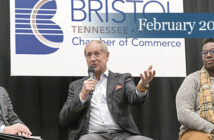Photo above: John Silvia, chief economist, Wells Fargo, at Bristol’s Paramount Center, Oct. 19. Photo by Scott Robertson
By Scott Robertson
The chief economist for Wells Fargo told a crowd of a few dozen businesspeople in Bristol last month that it’s virtually a given that interest rate hikes are on the way, but that no one should hold their breath waiting for politicians in Washington to start putting hard economic realities ahead of political expediency in their decision-making processes.
John Silvia’s overall outlook could be summed up as, “economic growth looks pretty good right now. Labor force participation rates and productivity are big barriers to stronger economic growth. We’re looking at inflation modestly rising and the Fed raising interest rates in December, so we should still have a solid economy with no signs of recession on the horizon.”
In crystal balling tax reform, Silvia said, “What really would make a difference is raising the standard deduction and dealing with the earned income tax credit and childcare credits. (Ed. Note: The proposed tax plan introduced two weeks after Silvia’s Bristol comments doubles the standard deduction, makes no changes to the earned income tax credit, and increases the child tax credit),” Silvia said. “Those will make a big difference for middle income America without getting into the problem of tax cuts for the rich. If you focus on the middle-class family, then the standard deduction will make a really big difference.”
Silvia had difficulty imagining deficit hawks like Senators Bob Corker and Rand Paul and members of the House Freedom Caucus accepting the deficits likely to accompany significant tax reform that isn’t accompanied by cuts to entitlements. “Given our budget constraints and the deficits projected by the Congressional Budget Office, it’s going to be pretty limited in terms of what you can do on tax reform.”
Silvia expressed disappointment in the Trump administration for not having “gone after” entitlements already. “That is the problem with the budget,” Silvia said. “I don’t see from this administration and this current Congress the willingness to really deal with that.”
“Economics has to operate in a political and social environment,” he explained. “One of the challenges in our economy is the whole movement of the baby boomers shifting the relative weight of those entitlements versus the rest of public spending. From an economics point of view, we have to deal with it. Maybe from a political point of view we can hope we don’t have to deal with it because the Japanese and Chinese may buy all our bonds.”
In looking at the CBO debt projections, Silvia said, debt and interest rates intertwine. “Our challenge is to sell a lot of this debt. There are three different buyers of treasury debt. One is the Fed. The Fed says they’re going to shrink their balance sheet. So, you’re going to sell more debt as one of your major buyers is shrinking? Not a good situation. Second is Japan and China. Politically and socially, to what extent are they going to continue to buy our bonds longer term? That’s really an open question. Then there’s the private sector. That’s a real challenge when those interest rates start going up because the asset value of some of your bond notes is going to start taking a hit. So how willing is the private sector going to be to spend more money buying those bonds?”
“My bet,” Silvia said, “is that over the next three to five years the benchmark probably goes up 150 basis points.” Why not more? “We don’t have any inflation to justify it and we still have a captive audience. Unlike 20 years ago, U.S. Treasury debt is oftentimes held as Tier 1 capital for a lot of banks like Wells Fargo. So as the banking industry grows, we have to own more Tier 1 capital. That gives us a built-in bias to buy treasuries.”
Still, Silvia was asked again, why not push to address entitlements now? “You just have to understand,” he said, “sometimes societies make decisions that from an economics point of view don’t make any sense at all.”




